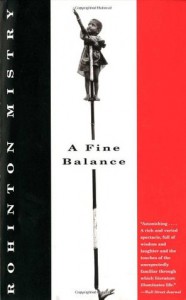Currently reading



History Always Favours The Winners
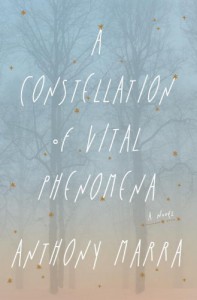
The morning after the Feds burned down her house and took her father, Havaa woke from dreams of sea anemones.
The moment after I read the opening line of A Constellation Of Vital Phenomena I sensed this was the beginning of a beautiful journey.
I was neither exactly right nor dead wrong.
For one thing, a very powerful topic is a very powerful topic. And it’s the Chechen-Russian conflict in this case, with a timeline that runs from the early years following the dissolution of the Soviet Union and the Chechen-Ingush ASSR split, to 2004, so it would take actual effort for this book to read even somewhat boring; it doesn't of course. The story is fascinating.
Moreover, Anthony Marra easily ticks most (not all and I'll explain why later on) of the relevant boxes in the “new talented kid around the writers’ block” checklist: his prose is
1. powerful,
2. beautiful,
3. affective,
4. memorable
and, occasionally, skilfully drizzled with poetry, so:
1. check,
2. check,
3. check,
4. and check
(no box ticking on the poetry thing; it’s an extra).
On the other hand, he overuses one of those pro-spoiler literary techniques that I find absolutely irritating and that I’ll describe through a hypothetical example that I’ll make up right now: “They looked at each other with hope for the future. How could they know that in five years time, one of them would suffer the loss of the other. One of them would face the most painful of deaths. But who would that be was impossible to foresee at that time of happiness”.
Thanks, but no thanks Anthony. And that’s on top of the back-and-forth-in-time core structure of the book, which by the way felt a little choppy to me, in the sense that even though each chapter flows smoothly, the connection between the 90s and the 00s is not seamless enough.
Most importantly, what I felt was the major hitch in this book was that it doesn't provide a convincing enough insight into the geographical and historical context of the events that it describes. Historical fiction needs to be self-contained to make sense, but A Constellation Of Vital Phenomena doesn't satisfactorily orient the reader through the specific circumstances of the Chechen wars.
I am perfectly aware that the author drew from several sources on Chechnya and modern Russia, as well as descriptions and insights into wartime Grozny and even took the time to visit Chechnya himself, but this is just not coming through the book. A Constellation of Vital Phenomena is a very moving story about ordinary people trying to pick up the pieces in the course and the aftermath of a war that could take place absolutely anywhere.
And that’s exactly why he ticks most of the boxes and not all of them. Not because of the lack of self-containment per se. But because he did take context into account, he did his research, he got the insight and still, he didn't manage to transfuse this knowledge through his writing.
Of course, this doesn't abolish my praise of Anthony Marra's talent above. A Constellation Of Vital Phenomena is a good book on the frailty of the human spirit and one that I’ll remember. Just not one that I couldn't have lived without. In any case, I’m definitely keeping an eye on what Anthony Marra does next. Something less depressing hopefully, but even if it’s still to be a post-war story, I’ll take it.
Who wins? The Americans or the Russians?
“Both”, his father said, glancing to the frost-filled windowpane.
“Then who loses?”
“Everyone else.”
Reading progress update: I've read 55 out of 130 pages.

"Democracy has historically unparalleled global popularity today yet has never been more conceptually footloose or substantively hollow. Perhaps democracy's current popularity depends on the openness and even vacuity of its meaning and practice-like Barack Obama, it is an empty signifier to which any and all can attach their dreams and hopes Or perhaps capitalism, modern democracy's nonidentical birth twin and always the more robust and wily of the two, has finally reduced democracy to a "brand," a late modern twist on commodity fetishism that wholly severs a product's salable image from its content."
- Wendy Brown
 3
3
Hero takes a (slight) fall
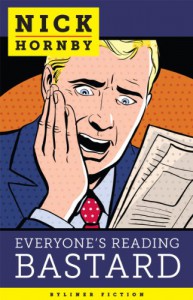
Nick Hornby, you are my hero.
I don’t think I can ever thank you enough for Fever Pitch and High Fidelity (YAY for all the re-reads!)
For sharing your thoughts on The Believer all these years.
For being such a great reader, in addition to being a fantastic writer. And it’s not just what you read. It’s also how you read and write about it!
For tirelessly compiling all these lists of your favourite books, movies and music.
For being such a fierce, frustrated and expressive Arsenal fan like I am.
For your talent in writing simply and breathtakingly beautifully and so so meaningfully.
For your impeccable taste and sense of humour.
For all the digressions and distractions. You make them not only fun, but also necessary.
For the little things. Not all people realize that they matter. You do.
For:
“Have you got any soul?" a woman asks the next afternoon. That depends, I feel like saying; some days yes, some days no. A few days ago I was right out; now I've got loads, too much, more than I can handle. I wish I could spread it a bit more evenly, I want to tell her, get a better balance, but I can't seem to get it sorted. I can see she wouldn't be interested in my internal stock control problems though, so I simply point to where I keep the soul I have, right by the exit, just next to the blues.”
So where is all that here Nick? Where are the lovably flawed characters? The spark? The warmth?? Is seems it’s all gone walkies and as much as I hate to say it, I hope not Everyone's Reading Bastard Nick. Not because there’s something wrong with it. It’s actually alright; fiver out of a ten. But you said it yourself:
“Books are, let's face it, better than everything else. If we played cultural Fantasy Boxing League, and made books go 15 rounds in the ring against the best that any other art form had to offer, then books would win pretty much every time. Go on, try it. “The Magic Flute” v. Middlemarch? Middlemarch in six. “The Last Supper” v. Crime and Punishment? Fyodor on points. See? I mean, I don’t know how scientific this is, but it feels like the novels are walking it. You might get the occasional exception -– “Blonde on Blonde” might mash up The Old Curiosity Shop, say, and I wouldn’t give much for Pale Fire’s chance against Citizen Kane. And every now and again you'd get a shock, because that happens in sport, so Back to the Future III might land a lucky punch on Rabbit, Run; but I'm still backing literature 29 times out of 30.”
So am I Nick, but I’m not sending Everyone's Reading Bastard to the ring. We might get away with it against Oliver Stone. But what happens if we’re paired up with Jim Jarmusch or Wes Anderson? Might as well put the rest of your work on the battling list instead. Then, it's in the bag.
 4
4
Reading progress update: I've read 103 out of 318 pages.
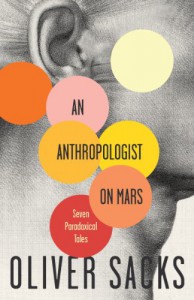
"He feels he has been given “a whole new world”, which the rest of us, distracted by color, are insensitive to. He no longer thinks of color, pines for it, grieves its loss. He has almost come to see his achromatopsia as a strange gift, one that has ushered him into a new state of sensibility and being."
I had almost forgotten how weird and absorbing Oliver Sacks's cases are. And how good a writer he is too.
 2
2
 4
4
Reading progress update: I've read 104 out of 509 pages.

Beyond blown away. Potential new favourite alert (fingers crossed!)
(People find this difficult and confusing??)
"Occasionally, I glimpse a truer Truth, hiding in imperfect simulacrums of itself, but as I approach, it bestirs itself & moves deeper into the thorny swamp of dissent".
Isn't objectivity a thistly trail always, indeed?
 11
11
STOP THE PRESS: 14 time travelling celebrities!
Blimey, I didn't know that [click me, I'm hilarious. And I come with a wee preview below]
Paul Mournet was born in 1847 and although he is recorded as dead in 1922, his body was never found. This is because Paul Mournet didn't die. He is Keanu Reeves.

And, there's another thing.
Nicolae Grigorescu was a writer and a painter who later changed his name and career. He is now known as Orlando Bloom and works as an elf.

"Be yourself; everyone else is already taken" anyone?
 7
7
Reading progress update: I've read 48 out of 249 pages.
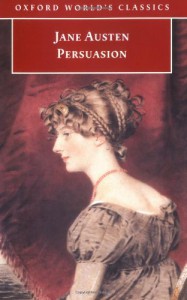
…Anne, who had been a most attentive listener to the whole, left the room, to seek the comfort of cool air for her flushed cheeks; and as she walked along a favourite grove, said, with a gentle sigh, "A few months more, and he, perhaps, may be walking here."
He better!
Rebel with a cause
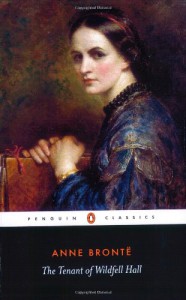
The Tenant of Wildfell Hall is a very brave, straight to the point social commentary on the prevailing ethics of the Victorian era. Anne Brontë deals with abuse, alcoholism, domestic violence, sexual ethics and infidelity, gambling, the social and marital status of women and inequalities of access to education for young girls. The protagonist, Helen Huntington (aka Graham), boldly violates social norms as she slams the door on her abusive husband, and the banging ”reverberated throughout Victorian England”, as author May Sinclair famously noted in the early 1900s.
Anne Brontë has produced a pioneering, highly feminist novel, a book that shocked Victorian society upon its release and even more so when it was revealed that the author was in fact a very young woman!
Anne’s depiction of middle-class bourgeois life in the 1800s is fantastic. The author unravels the story through a series of documents; letters and diaries, creating an interesting dense, multi-layered setting, while demonstrating different perspectives depending on the narrating voice which is being presented each time.
The prose is down-to-earth realist and I disagree with those who don’t see passion in it; most notably her sister Charlotte who consistently blocked its re-publication on the grounds that “it hardly seems to me desirable to preserve ... the choice of subject in that work is a mistake”. That was of course after the book had become an immense success, despite the mixed critical reception, instantly upon its original release, and everybody knows that Charlotte was as jealous a bitch (of both Emily and Anne) as she was talented.
Anne defied the sharp criticism of her book as coarse through her notes on the Second Edition of the Tenant that read: “My object in writing the following pages was not simply to amuse the Reader; neither was it to gratify my own taste, nor yet to ingratiate myself with the Press and the Public: I wished to tell the truth, for truth always conveys its own moral to those who are able to receive it.”
Now a widely acclaimed landmark feminist book, The Tenant of Wildfell Hall feels like the perfect revenge for Anne Brontë against those who named her weak, passionless and inexperienced. A true literary gem by a real radical.
Reading progress update: I've read 108 out of 320 pages.

"As Levitt sees it, economics is a science with excellent tools for gaining answers but a serious shortage of interesting questions."
That's very true Stephen. BUT WHERE ARE THE ECONOMICS IN HERE? Didn't want to use economics in the first place, hence the title? Where are the Statistics? The evidence? You talk about SCIENCE? What science?
Lovely gloomy rainy morning, with my books and the unique melancholy of Hood from their album Outside Closer (domino, 2005)
#GreatestUnderratedBritishBands
#HoodUniverse
 3
3
Not looking that good on paper, Rachel

I haven't read other Martin Amis novels. I have read analyses about Martin Amis, I have read interviews of Martin Amis and I have read raving reviews of OTHER novels of Martin Amis and I believe everybody who praises his talent. Unfortunately I should have also believed the people who praise his talent and who warned me not to choose The Rachel Papers as an introduction to his work, on the grounds that – surprisingly enough - it sucks.
I didn't and it was a big mistake. I chose The Rachel Papers in the hope that it would turn out to be my High Fidelity of the 70s (without the music), or at least a light version of it, because to actually match High Fidelity is too ambitious even for comparable books that chronologically precede it. I also hoped it would turn out to be an easy and fun read about teenage lust, which would be GREAT. Give me the Footloose and Pretty In Pink v̶i̶d̶e̶o̶t̶a̶p̶e̶s̶ ok it’s dvds, anytime and I’ll watch them, never mind the dozens of times I already have done so. For each of these movies.
/end of synopsis of (laughable in retrospect) expectations.
Well. This was no fun read for sure. It wasn't even an easy read and it's a short one, and suffice to say, I won't dignify that book with the slightest comment on potential proximities to a 70s version of anything even remotely related to the Hornby universe.
So what is The Rachel Papers?
The Rachel Papers is an incredibly B-O-R-I-N-G and badly written coming of age novel about some Charles 20-year old who, similarly to the entire book, is completely humourless. Charles doesn't give a fuck about anything in life except getting laid, preferably with the number one popular Rachel girl, with whom he is obsessed. Which is fine. And completely understandable if you’re not even 20, like Charles.
Unfortunately, at least for a human (can’t vouch for extraterrestrials), Charles also features a remarkably rare combination of all of the following: inferiority complexes, delusional ideas of grandeur, sinister feelings for his father, lack of trustworthiness, self-esteem instability, lack of empathy towards everybody, hallucinational – apparently - ideas that planetary systems where being a complete arsehole is cool are already known to man and a desperate need for attention. He is exactly the kind of person who will try to sell their half-knowledge of the Dostoyevsky wikipedia entry (and maybe of one of those short stories by Pushkin) as expertise on Russian literature. You know how it goes.
Of course, lovely books where the main character is a complete jerk are not only perfectly possible, but also in existence, in abundance. In fact, 1984 and Crime And Punishment have to be my two most favourite books ever (so far anyway), and the protagonists in both books suck. They suck. One of them is also a murderer! So that's clearly not an issue for me.
The issue is that Charles both sucks and has nothing to share with the reader, good or bad. Top this up with a bunch of extra two-dimensional underdeveloped characters – yes; that means Rachel too – and an obnoxiously crude writing style and that's it.
Does this sound tempting to you?
I didn't think so.






 2
2


 2
2




